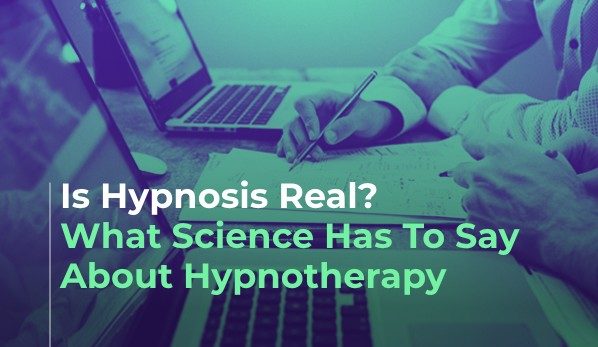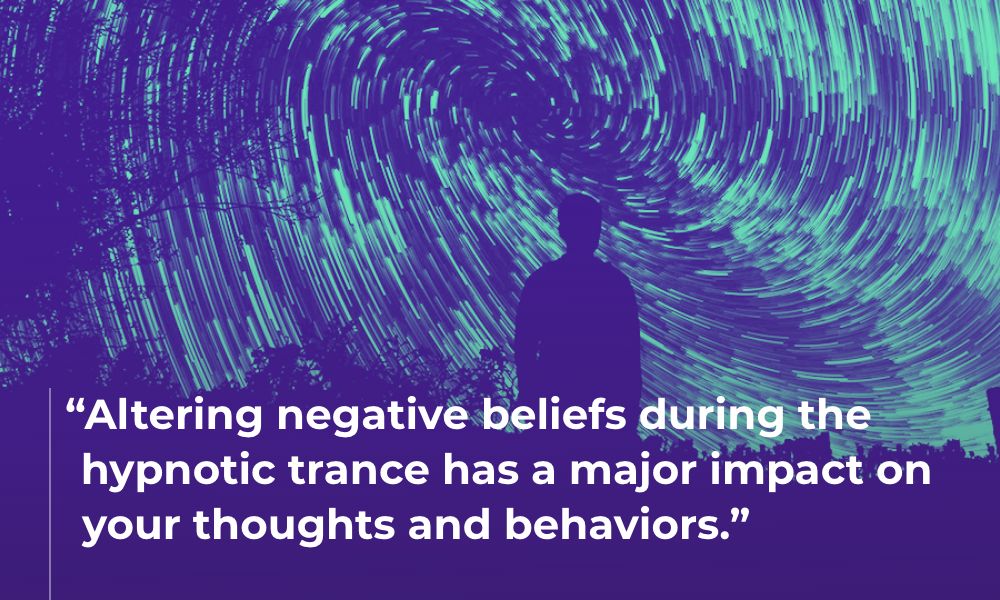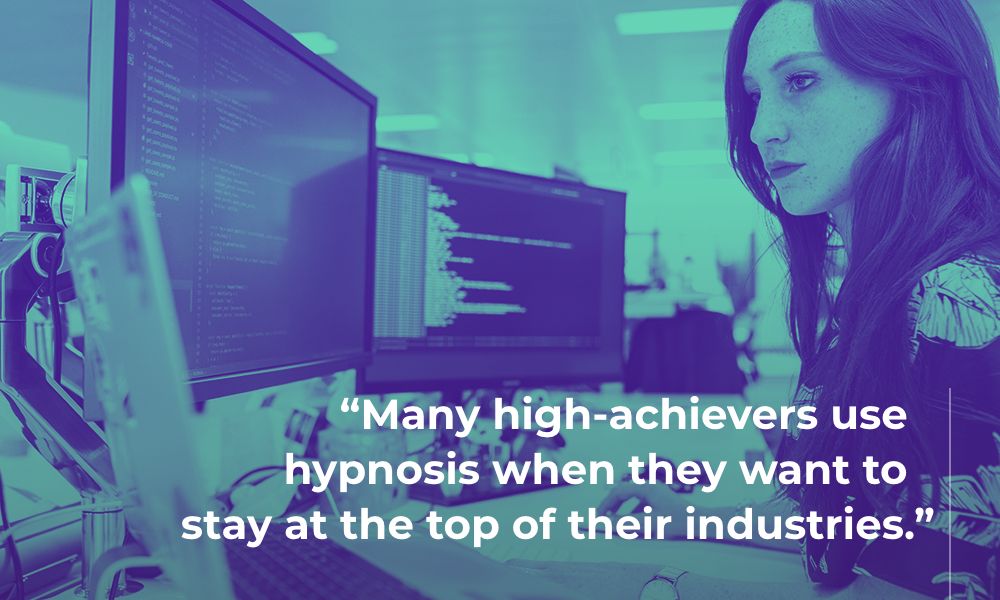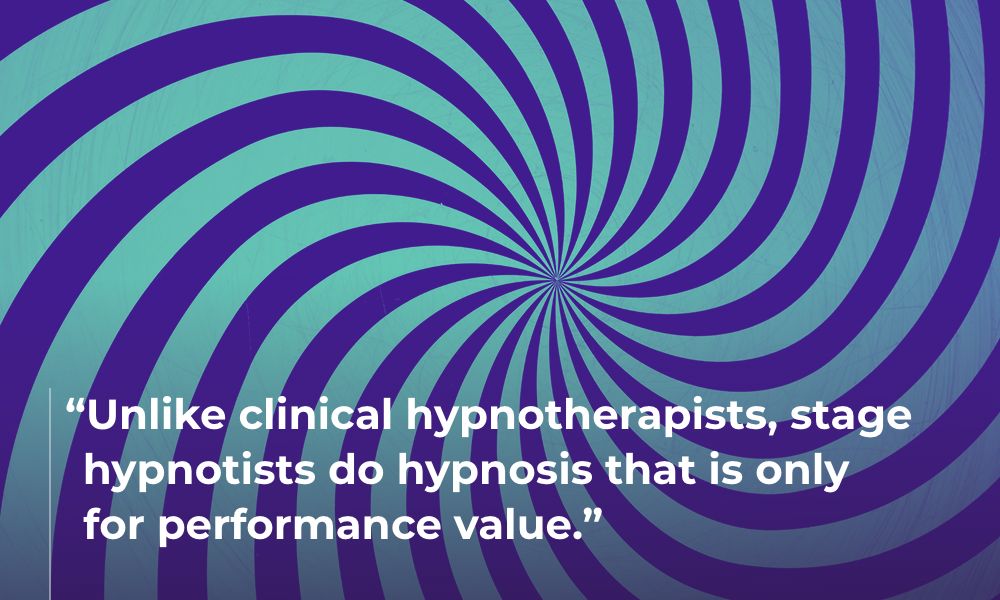Hypnosis is a real tool that’s effective in addressing a variety of goals. From lessening your anxiety to helping you quit smoking and even improving your public speaking skills, hypnosis has dozens and dozens of uses. In this article, we explore what hypnosis is, how it works and where and how it’s used. We also let you in on the best way to start using hypnosis to improve your life right away.
What Hypnosis Is
Hypnosis is a safe and relaxing process in which you enter a trance-like state. In this hypnotic trance, your subconscious mind is highly suggestible and your hypnotist uses this opportunity to give you positive, helpful suggestions, whether that be in person, via a recording, or with self-hypnosis. These hypnotic suggestions help you change your thoughts and behaviors on a core level, enabling you to reach your goals.
The Science Behind Hypnosis
Hypnosis is real, and it works. To understand how it works, let’s start by understanding the conscious and subconscious minds.
You use your conscious mind every day to help you make reasonable, logical decisions.
Beneath your conscious mind lies your subconscious mind. Your subconscious mind influences everything you think and do. The subconscious mind stores every experience and deeply-held belief you’ve ever had. It filters your behaviors, thoughts, and decisions through these beliefs.
But, as you’re probably aware, not every experience, belief, or habit is positive and productive for your life. Nonetheless, your subconscious mind stores these unhealthy notions, and they can negatively influence your thoughts and actions. They may lead to a lack of self-confidence, anxiety, overeating, or other undesirable outcomes.
This is where hypnosis comes in. By inducing a trance-like state of consciousness, your subconscious mind becomes easy to influence. A hypnotist or hypnosis app can then help you remove or reframe those negative beliefs and experiences. Altering negative beliefs during the hypnotic trance has a major impact on your thoughts and behaviors. After you come out of your hypnotized state, the results continue in your day to day, waking life.
The Neuroscience
Anyone who’s experienced hypnosis knows that it works, and the evidence is in their improved thoughts and behaviors. But you can see evidence of hypnosis in studies of their brains, too.
David Spiegel, Professor and Associate Chair of Psychiatry and Behavioral Sciences at Stanford, scanned the brain regions of subjects participating in hypnosis and found some fascinating results.
During hypnosis, activity decreases in the dorsal anterior cingulate. This is the area of the brain that processes incoming information. When activity here slows, the subconscious mind is easier to reach.
The scans also found that hypnosis increases the mind-body connection. This was demonstrated through increased activity between the dorsolateral prefrontal cortex and the insula. This shows us that hypnosis can help you make impactful change, not only at an intellectual level but at a core, functional level too.
And finally, the brain scans showed that hypnosis temporarily reduces the connection between the brain’s executive control network and the default mode network. This means that hypnosis allows you to circumvent the rigid thought patterns that prevent you from making positive changes and, instead, find new ways to reach your desired results.
What Settings are Hypnosis Used in?
Hypnosis is more common than you may think! Did you know that some of your favorite athletes, like Wayne Gretzky, Tiger Woods, Mohammed Ali, and Michael Jordan, have used hypnosis to improve their athletic performance? So too have plenty of other big names—from Albert Einstein to Kate Middleton and even Henry Ford.
Today, many high-achievers use hypnosis when they want to stay at the top of their industries. So too do expecting moms who want to overcome morning sickness. Maybe your next-door neighbor even uses self-hypnosis to help them quit smoking or lose weight.
The point is this: Lots of different people in lots of different settings use hypnosis. That’s because hypnosis can help you overcome whatever mental blocks are preventing you from being your best. Let’s explore a few of the different hypnotism settings below:
Hypnotherapy and Clinical Hypnosis
Hypnotherapy is simply the name of the type of therapy that uses hypnosis. Technically, hypnosis is the state of mind you’re in when you’re being hypnotized. But “hypnosis” and “hypnotherapy” are often used interchangeably when being discussed.
Just as it sounds, clinical hypnosis is hypnotherapy that occurs in a clinical setting, like a doctor or therapist’s office.
Combination Therapy
You may use hypnosis in combination with behavioral therapies, like Cognitive Behavioral Therapy (CBT), to help enhance your results. This may also have an insurance benefit since some insurance companies will not cover hypnosis on its own. But they may cover it if you use it with CBT.
Forensic Settings
One of the many benefits of hypnosis is that it can help you recall memories that you’ve unintentionally repressed. Your subconscious may repress memories if they feel too traumatic. In forensic settings, hypnosis is a tool to help consenting witnesses recall the events of a crime they witnessed. Their recollections can help with solving the crime.
Entertainment
For many years, entertainment hypnosis (also known as stage hypnosis) has been a form of amusement. Unlike clinical hypnotherapists, stage hypnotists do hypnosis that is only for performance value.
The trick of stage hypnosis is finding the few people in the crowd who want to be active participants in the show. Everyone knows what to expect when they go to a show like this, and a certain segment of the audience want to be the main attraction. The skill of a stage hypnotist is finding the person in the crowd who secretly wants to run around stage clucking like a chicken
The effects of the hypnosis performed by stage hypnotists are short-lasting and tend to be more “silly” in nature. On the other hand, clinical hypnotists use hypnosis to help participants reach their serious, long-term goals.
Results and Effects of Hypnosis
Hypnosis helps you make behavioral and ideological changes at a deep, subconscious level. That’s why the benefits of hypnosis are so vast. You can use it to improve just about anything you can think of—from reducing anxiety symptoms to getting better at your sport of choice.
Hypnosis is most popular for helping with day-to-day issues. Things like:
- Falling asleep faster and getting deeper, more restful sleep
- Quitting an unhealthy habit, like smoking or overeating
- Addressing phobias
- Improving success and self-confidence
Studies have also demonstrated hypnosis’ success with a range of conditions, including (but not limited to):
- Getting better quality sleep and falling asleep more quickly
- Helping to reduce both stress and anxiety
- Preparing for a surgery
- Improving self-esteem
- Helping to reduce chronic pain
- Helping you recover from addiction
- Reducing symptoms of conditions like irritable bowel syndrome (IBS)
- Helping you quit smoking
- Helping to cope with grief
- Helping to combat eating disorders
- Augmenting cognitive behavioral therapy results
If you have an issue in your life that feels particularly “sticky”—where your typical coping mechanisms aren’t working or you feel stuck behind a mental block—hypnosis is an excellent option to try.
Final Thoughts
Hypnosis is a very real and powerful tool that nearly anyone can benefit from in some capacity. Whether you want to use hypnosis for smoking cessation, kicking bad habits, combating PTSD, emotional regulation, or something else entirely, hypnosis is real and can work. And unlike medications, hypnosis has virtually zero side effects.
Plus, you don’t have to visit a hypnotist to get the benefits of hypnotherapy. A hypnotic app like Primed Mind makes it easy to receive the benefits of hypnosis from the comfort of your own home.
Free to download, Primed Mind features dozens of hypnotic “primers” designed to help you reach your goals in just 5-20 minutes per day. Whether you want to improve your sleep, find success working from home, release stress, or simply get an excellent start to your day, there’s a Primed Mind Primer for that. Download Primed Mind now and start seeing results today.




